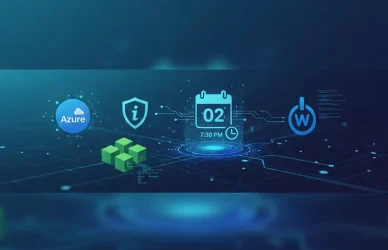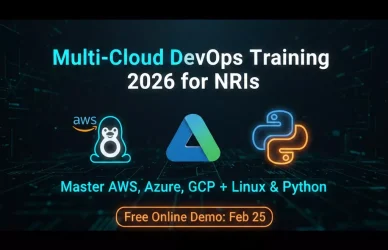Why DevOps Day 0 Matters
The DevOps landscape is evolving rapidly with tools like Docker, Kubernetes, Terraform, and Jenkins becoming industry standards. Yet, most DevOps roadmaps overlook one crucial stage: DevOps Day 0 — the foundation every aspiring DevOps professional needs before diving into advanced tools.
At CloudDevOpsJobs.com, we emphasize mastering Day 0 concepts like networking, databases, security, storage, disaster recovery, data replication, and caching. These skills form the base for efficiently optimizing and managing modern cloud-native systems. Because in reality, DevOps is 20% building and 80% optimizing.
This article breaks down the DevOps Day 0 Roadmap, equipping both beginners and professionals with the essential skills to thrive in DevOps, Cloud, Kubernetes, Infrastructure as Code (IaC), GitOps, and MLOps.
The DevOps Day 0 Roadmap: Foundational Skills
Before you dive into containerization, CI/CD, or cloud services, build your foundation with these seven critical areas:
1. Networking: The Backbone of DevOps
Understanding networking is essential for managing distributed systems, cloud platforms, and Kubernetes clusters.
Key Concepts:
- TCP/IP: Core data communication protocols
- DNS: Domain name resolution for service discovery
- HTTP/HTTPS: Secure web communication
- VPN & Load Balancers: Secure connections and traffic management
- Firewalls & Protocols: Understand UDP, ICMP, FTP, and more
- Subnetting: Efficient IP allocation for scalable infrastructure
Why It Matters: Solid networking knowledge helps you troubleshoot, optimize services, and secure cloud deployments.
Pro Tip: Create a basic home lab with VPN and load balancers to simulate enterprise networks.
2. Databases: The Heart of Data Management
Databases power applications, analytics, and MLOps. Knowing how they work is vital for scalability and reliability.
Key Concepts:
- SQL vs NoSQL: Compare relational (MySQL) and non-relational (MongoDB) models
- ACID Properties: Ensure data integrity
- Scalability: Horizontal vs vertical database scaling
- Data Modeling: Optimize schemas for performance
Why It Matters: Databases are central to every app. In MLOps, they’re essential for handling large datasets.
Pro Tip: Test SQL and NoSQL workflows using PostgreSQL and MongoDB.
3. Security: Protecting Systems and Data
Security is critical in DevOps, especially in cloud and containerized environments.
Key Concepts:
- Encryption: TLS/SSL for secure communication
- Authentication & Authorization: OAuth, JWT, RBAC
- OWASP Top 10: Mitigate common vulnerabilities like SQL injection
- Policies & Compliance: Understand security standards and regulations (GDPR, HIPAA)
- Risk Management: Proactively identify and resolve security threats
Why It Matters: Weak security undermines infrastructure. Secure pipelines and configurations are non-negotiable.
Pro Tip: Explore the OWASP Top 10 and secure a Kubernetes cluster using RBAC.
4. Storage: Managing Data Efficiently
Different workloads require different types of storage. Choose wisely to ensure speed and scalability.
Key Concepts:
- Block Storage: Great for high-performance databases
- Object Storage: Ideal for unstructured data like logs, media files (e.g., S3, Azure Blob)
- File Storage: NAS and SAN systems for shared access
- SSD vs HDD: Trade-offs between speed and cost
Why It Matters: Optimizing storage boosts application performance and reduces cloud costs.
Pro Tip: Set up object storage with MinIO or AWS S3 to experiment with real-world workflows.
5. Disaster Recovery (DR): Ensuring Business Continuity
Downtime is costly. A proper disaster recovery plan helps you stay resilient.
Key Concepts:
- Backup and Restore: Reliable and testable recovery
- Pilot Light: Maintain minimal infrastructure for rapid scaling
- Warm Standby: Semi-active environments for faster failover
- Multi-site Deployment: Redundant systems across geographies
- RTO & RPO: Define acceptable downtime and data loss
Why It Matters: DR planning is crucial for Kubernetes, multi-cloud, and regulated environments.
Pro Tip: Simulate outages and restore environments from backups in your cloud sandbox.
6. Data Replication: Ensuring Data Availability
High availability depends on replication—especially in distributed or cloud-native systems.
Key Concepts:
- Master-Slave & Peer-to-Peer: Data sync architectures
- Synchronous vs Asynchronous: Balance latency and consistency
- Consistency Models: Understand eventual vs strong consistency
- Replication Topologies: Choose the right design for scale
- Log Shipping: Use write-ahead logs to replicate data
Why It Matters: Replication prevents data loss and enables global scalability.
Pro Tip: Set up MySQL master-slave replication and monitor consistency.
7. Caching: Boosting Performance
Caching minimizes server load and accelerates applications.
Key Concepts:
- In-memory Caching: Redis, Memcached for lightning-fast access
- CDNs: Content delivery for global performance
- Cache Invalidation: Ensure content freshness
- Write-through vs Write-back: Choose your cache update strategy
- Cache Hit Ratio: Measure and optimize effectiveness
Why It Matters: Critical for reducing latency in microservices and MLOps pipelines.
Pro Tip: Deploy Redis and test different caching strategies for web app performance.
Connecting Day 0 to DevOps, Cloud, and Beyond
Day 0 knowledge connects directly to advanced DevOps concepts:
- Cloud Platforms (AWS, Azure, GCP): Rely on Day 0 fundamentals like networking, storage, and security
- Kubernetes: Requires deep understanding of load balancing, service discovery, and persistent volumes
- IaC (Terraform, Pulumi): Security and networking principles ensure robust and efficient infrastructure
- GitOps: Secure and scalable CI/CD pipelines rely on a solid foundational stack
- MLOps: Data storage, replication, and caching are essential for managing training and inference pipelines
Mastering Day 0 makes learning advanced tools easier and more impactful.
How to Get Started with DevOps Day 0
- Learn the Basics: Start with trusted learning platforms and communities like CloudDevOpsJobs.com
- Get Hands-On: Build a home lab with real-world simulations
- Certify Your Skills: Try foundational certifications like CompTIA Network+ or AWS Solutions Architect – Associate
- Join the Community: Follow DevOps leaders and forums on X (Twitter), Reddit, and LinkedIn
- Build Mini Projects: Practice by deploying secure, high-performing apps using caching and DR
Conclusion: Build a Strong Foundation for DevOps Success
The DevOps Day 0 Roadmap is your launchpad into a rewarding DevOps career. By building strong expertise in networking, databases, security, storage, disaster recovery, replication, and caching, you’ll be prepared for the most advanced cloud-native and DevOps challenges.
Whether you’re aiming to master Kubernetes, IaC, GitOps, or MLOps, it all begins with Day 0.
Visit CloudDevOpsJobs.com for curated job listings, hands-on tutorials, and resources tailored for your DevOps journey.
Share this article with your network to spread awareness about the importance of Day 0 in DevOps career success.







